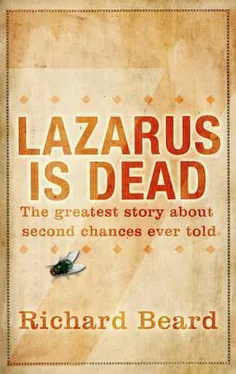The demon does not come out. The smell remains.
As a small comfort, the betrothal ceremony will at least take place outside, sanctioned beneath the eyes of god. Lazarus is determined to go through with it, because his business is neglected and failing: he needs Isaiah more than ever. He holds Mary’s hand. ‘You’ve been so good to me. Isaiah won’t let you starve, not when you’re family.’
Yanav buys more perfume. Nard is the best, and it comes in oil form in half-litre flasks at three hundred coins apiece. Martha questions the extra expense, but a genuine healer uses only the finest materials. Yanav rubs a handful of the perfumed oil in circles onto Lazarus’s chest. He can’t understand it: the rash and the pustules stay the same, but the smell is always worse.
Yanav’s treatments gradually take effect. True, Lazarus isn’t visibly better, but nor is he any worse.
His cough has stabilised, whereas villagers unable to afford a healer would expect, by now, blood to be appearing in the sputum. The blisters on his tongue, a symptom feared throughout the region, have neither swollen nor burst. The pustules harden but stay intact, and astonishingly both Martha and Mary remain untouched. They are models of robust good health.
Lazarus loses weight and his eyesight weakens, but his digestion steadies because Yanav feeds him earth. Every morning he makes a paste with goat’s blood and powder from the termites’ nest.
Yanav sometimes asks questions about Rome, Romans, and the probability, in Lazarus’s opinion, as a respected tradesman in Jerusalem, of a popular uprising that could threaten the rule of the foreign oppressors. But he does this while applying a compress of moss and honey to the scabies rash, and Lazarus usually ignores the questions as he waits for an end to the itching. The end soon comes. Yanav works another miracle when he bleeds Lazarus with a cut beneath the armpit — his body cools, the fever briefly subsides.
He gives Lazarus fish oil to drink, but in a month and a half nothing conquers the smell. The demon is weakening, Yanav is sure of it, but he has yet to cast the enemy out.
Lazarus doesn’t always help. He wastes energy on self-pity and regret, because his life feels diminished. Each day holds fewer possibilities than the last, his choices fading as if heroic reunions and legendary adventures might now never happen. Poc. The options disappear, one after another they vanish. Poc.
Lazarus will not have it. Life must not close down. He will stand in Jerusalem for his betrothal, no matter how he gets there. He will assert his will, ride on Yanav’s one-eyed donkey, do whatever needs to be done.
4
Yanav chants invocations to every deity he can remember. There are so many gods, and most of them are difficult to please. He exhausts the remedies in his saddlebags, and makes regular trips to the market to search for fresh ingredients.
It is in the Bethany market, without any warning, that Cassius pulls him aside. Yanav looks sideways at him, at the pale northern sky of his eyes. The Roman is disguised as an out-of-town trader.
‘How’s Lazarus?’
‘This isn’t the place or the time.’
‘You haven’t kept in touch. I hear he’s worse since Jesus came to Jerusalem.’
Every healer has a last patient, a heavy defeat. Yanav does not intend his to be Lazarus.
‘We know he’s running out of money,’ Cassius adds. ‘Why are you trying so hard?’
‘I’m a healer. He’s an interesting case. Not what I expected.’
‘I only asked you to keep an eye on him.’
‘He’s dying.’
‘Good.’
‘Really?’
Cassius is under no obligation to explain himself. He has decided that now is the time for the Romans to influence events. The Sanhedrin priests have mixed intentions, and, although they value the rule of law, they can be impulsive, and act without subtlety. Romans are more experienced in the practice of power, and Cassius prides himself on the delicacy of his judgement — it is better for everyone if Lazarus stays sick. This will neutralise Jesus. He can stage as many miracles as he likes, but his followers will always doubt him if he appears powerless to help his friend.
‘I hear you’re planning to take Lazarus to Jerusalem.’
‘For his betrothal. Have a heart.’
‘Be very careful. I don’t want him meeting with Jesus.’
The Sanhedrin priests are the next to react. Jesus makes them nervous, especially in Jerusalem, because he knows how to appeal to the dissatisfied. He steals their spiritual attention, and the priests have the most to lose. They have a status to maintain, a living that needs to be earned.
Later, when Lazarus comes back to life, we learn the depth of the Sanhedrin’s resentment: ‘ So the chief priests made plans to kill Lazarus too, because on his account many Jews were rejecting them and believing in Jesus ’ (John 12: 10–11).
Lazarus is not their first encounter with rejection, or the religious competition offered by Jesus. So what would their ‘plans’ involve? How does a committee of senior priests set about murdering an opponent?
They could hand him over to the occupying forces and intrigue for a crucifixion. But only as a last resort. Alternatively, they can do what they’ve done for centuries. They call on the Sicarii, the dagger-men.
The Sicarii are a sect of first-century Jewish assassins. Their signature weapon is the dagger, and they are known for their efficiency and discretion. They travel under assumed names, and are expert at living unnoticed among strangers.
In the village of Nain, on the lower slopes of the Hill of Moreh overlooking the Esdraelon Plain, Baruch stalks the widow’s boy who claims to have returned from the dead. ‘ On his account many Jews were rejecting the priests and believing in Jesus .’ Resurrection is as intolerable now as it will be in three months’ time with Lazarus. These Jesus charades must stop, and quickly — the Sanhedrin have made their decision.
For three days, mainly from the roof of the synagogue, Baruch watches the widow’s house. He changes his position with the sun, so that whatever the time of day he is a shadow within a shadow.
At dusk the widow comes into her yard. She fills a water bowl for her chickens, then throws out handfuls of grain from her apron. She dusts off her hands and looks nervously about, as if she knows. She has felt like this for months, even before the death of her son. She bustles inside and bolts the door.
*
First-century Jews aren’t stupid. They’re not very different from who we are today, and if they were the events of those times would cease to have any relevance. They’re sceptical. They think about Jesus and look for the joke, as in later years comfort will be found in Monty Python’s The Life of Brian (1979), or Gore Vidal’s Live from Golgotha (1992).
A gang of jeering young Sadducees, encouraged by the Sanhedrin, follow Lazarus into Jerusalem. They mock his sharp, sick features, the shaven cheeks sunk between bones. He looks like death, but nobody fears contamination because his sisters walk behind him with their heads held high.
‘He deserves it. Didn’t know his place.’
‘Galilean. It was his choice to shave. Can’t say he wasn’t warned.’
The social acceptance of Lazarus, it seems, is conditional on his success. Either that, or there is relief that his illness disproves the unsettling power of Jesus.
‘Looks bad, smells worse.’
They snigger, and laugh at what it means to be friends with the One. They hold their noses and slap their thighs, suck dates and blow out the long dry pips. Whenever the wind changes they shriek and clamp their nostrils shut. Everyone said it was true and it is. He stinks to high heaven.
Читать дальше












